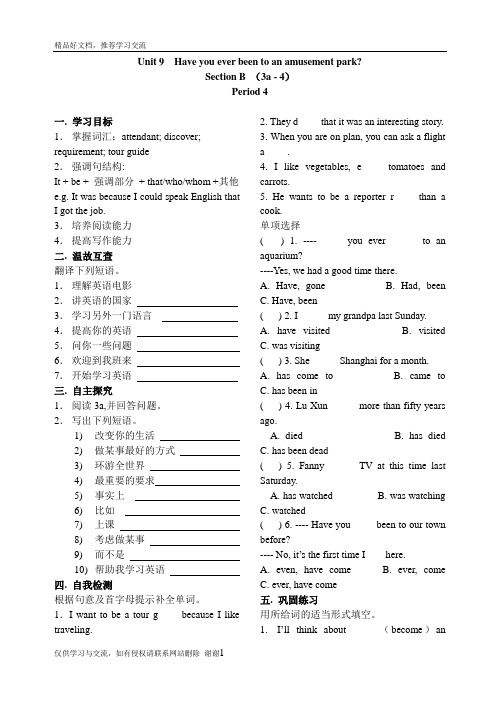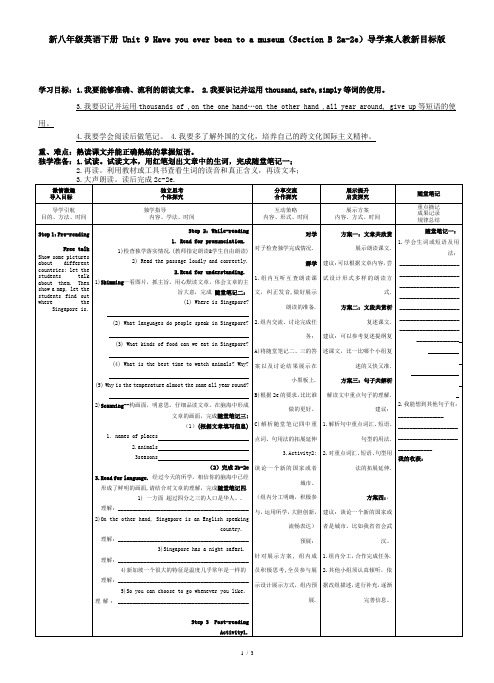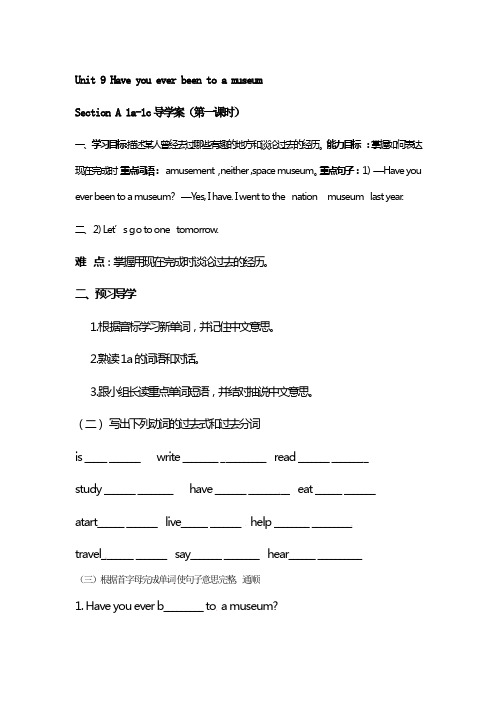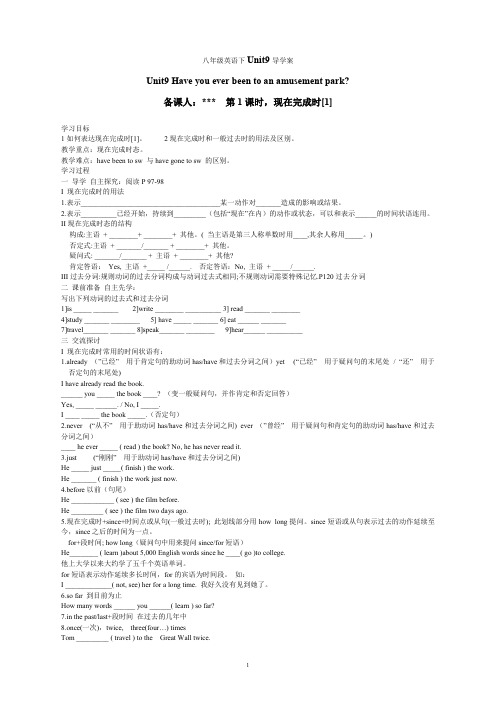(年级组精编)2015年新目标八年级下Unit9导学案 “五环四互”教学模式(共6课时)
最新人教版初中英语八年级英语下册unit9导学案

Unit 9 Have you ever been to an amusement park?Section B (3a - 4)Period 4一.学习目标1.掌握词汇:attendant; discover; requirement; tour guide2.强调句结构:It + be + 强调部分+ that/who/whom +其他e.g. It was because I could speak English that I got the job.3.培养阅读能力4.提高写作能力二.温故互查翻译下列短语。
1.理解英语电影____________________ 2.讲英语的国家3.学习另外一门语言4.提高你的英语5.问你一些问题6.欢迎到我班来7.开始学习英语三.自主探究1.阅读3a,并回答问题。
2.写出下列短语。
1)改变你的生活2)做某事最好的方式3)环游全世界4)最重要的要求5)事实上6)比如7)上课8)考虑做某事9)而不是10)帮助我学习英语四.自我检测根据句意及首字母提示补全单词。
1.I want to be a tour g____ because I like traveling. 2. They d____ that it was an interesting story.3. When you are on plan, you can ask a flight a____ .4. I like vegetables, e____ tomatoes and carrots.5. He wants to be a reporter r____ than a cook.单项选择( ) 1. ----_____ you ever _____ to an aquarium?----Yes, we had a good time there.A. Have, goneB. Had, beenC. Have, been( ) 2. I _____ my grandpa last Sunday. A. have visited B. visited C. was visiting( ) 3. She _____ Shanghai for a month. A. has come to B. came to C. has been in( ) 4. Lu Xun _____ more than fifty years ago.A. diedB. has diedC. has been dead( ) 5. Fanny _____ TV at this time last Saturday.A. has watchedB. was watchingC. watched( ) 6. ---- Have you ____ been to our town before?---- No, it’s the first time I ___ here.A. even, have comeB. ever, comeC. ever, have come五.巩固练习用所给词的适当形式填空。
新八年级英语下册 Unit 9 Have you ever been to a museum(Section B 2a-2e)导学案人教新目标版.doc

新八年级英语下册 Unit 9 Have you ever been to a museum(Section B 2a-2e)导学案人教新目标版学习目标:1.我要能够准确、流利的朗读文章。
2.我要识记并运用thousand,safe,simply等词的使用。
3.我要识记并运用thousands of ,on the one hand…on the other hand ,all year around, give up等短语的使用。
4.我要学会阅读后做笔记。
4.我要多了解外国的文化,培养自己的跨文化国际主义精神。
重、难点:熟读课文并能正确熟练的掌握短语。
独学准备:1.试读。
试读文本,用红笔划出文章中的生词,完成随堂笔记一;2.再读。
利用教材或工具书查看生词的读音和真正含义,再读文本;一、翻译下列词组:1)数以千计__________________________ 2)一方面,另一方面 _________3)四分之三的人口____________________ 4)在白天________5)一年四季______________ 6)靠近赤道 ______________7)一个说英语的国家________________ 8)不管…还是… _______________9)在晚上 ___________________ 10)醒来 ___________________11.)离…远…_______________________二、阅读填词(每空1分,共10分)Last Saturday afternoon Mr Chen Left home early to go fishing. Very soon he got to a r ____1 ___. He sat on the riverside and b ____2___ to fish. The sun was shining brightly o __3____ his head, but he didn’t c ___4____. Unluckily, When the sun w ___5___ down, he still hadn’t caught any fish, so he felt very sad. He thought that his wife might be angry with him bec ause he had caught nothing. How to s ___6___ his face? He b ___7___ worried. Suddenly he got an i ____8___. He ran to the fish market at once and bought two big f ____9___. The he hu rried home h ____10____, thinking that his wife would say something good to him.1. r__________2. b __________3.o__________4. c __________5. w__________6. s__________7. b __________8. i__________9. f_________ 10. h__________三.小练笔:介绍你曾经去过的旅游城市(注意时态)____________________________________________________________________________________________________________________________________________________________________________________________________________________________ ______________________________________________________________________________________________________________ ______________________________________________________________________________________________________________ ______________________________________________________________________________________________________________ ______________________________________________________________________________________________________________ ____________________________________________________________________________________________________________。
【八年级】新目标八年级英语下册Unit9 Section B导学案

【八年级】新目标八年级英语下册Unit9 Section B导学案【八年级】新目标八年级英语下册unit9sectionb导学案八年级(低年级)英语学科指导案例unit9 haveyoueverbeentoanamusementpark?(B节)教师寄语:custommakesallthingseasy.有个好习惯,事事皆不难。
一、学习目标1)单词与短语exchangestudent,attendant,flightattendant,discover,requirement,guide,tourguide2)目标句型:1.wheredoyouwanttogo?2.你去过……多久了…?3.whatdoyoulikebestaboutdoingsth.?4.你想要什么样的工作?5.howdo/didyoudosth.?3)语法现在完成时。
二、教学重点和难点1.教学重点:现在完成时。
2.教学难点:现在完成时态。
三、知识链现在完成进行时态。
四、学习指导:通过小组合作学习,探究讨论,结合导学案及相关资料理解各知识点,掌握本节学习内容。
五、指导学习过程:1.组长带领组员复习现在完成进行时。
2.组长带领团队成员通读第71页至第72页,理解其含义并填写表格。
3.组长带领组员熟读3a,并指定堂朗读人选。
4.组长带领团队成员找出这篇文章的重要短语和句子(从第71页到第72页)。
并为展厅指定候选人。
nguagepoints:(一) Havebeento/havevoneto差异1)havebeento表示曾经去过某处,但现在人不在那了。
可以和次数连用。
我去过北京。
我去年去过那里。
ihavebeentoshanghaitwice.如果遇到adv.(where,here,there,home,outside),省略haveyoueverbeenabroad?你去哪儿了?2)havegoneto已经去了某地,现在人可能在去的途中或返回途中,或已在那了。
人教版八年级下册英语Unit9全单元导学案

Unit 9 Have you ever been to a museumSection A 1a-1c导学案(第一课时)一、学习目标:描述某人曾经去过哪些有趣的地方和谈论过去的经历。
能力目标:掌握如何表达现在完成时重点词语 : amusement,neither ,space museum。
重点句子: 1) —Have you ever been to a museum? —Y es, I have. I went to the nation museum last year. 二、2) Let’s go to one tomorrow.难点:掌握用现在完成时谈论过去的经历。
二、预习导学1.根据音标学习新单词,并记住中文意思。
2.熟读1a的词语和对话。
3.跟小组长读重点单词短语,并结对抽说中文意思。
(二)写出下列动词的过去式和过去分词is _____ _______ write ________ __________ read _______ ________study _______ ________ have _______ _________ eat ______ _______atart______ _______ live______ _______ help ________ _________travel_______ _______ say_______ ________ hear______ __________(三)根据首字母完成单词使句子意思完整, 通顺1. Have you ever b_________ to a museum?2. They have g_____ to see the movie. It’s so interesting.3. I hope that they will have a wonderful time in the a park.4. ------I have never seen such an interesting water park.----Me n .5. I like animals in water . So I’m going to an a四、合作探究现在完成时(一)I.用法:现在完成时表示过去发生的动作对现在造成的影响或结果。
八年级英语下册《Unit9》教学设计 人教新目标版

山东省邹平县实验中学八年级英语下册《Unit9》教学设计人教新目标版本学期第课时本单元第课时上课日期:________主备人:复备人:___________ 审核人:____________学习目标:1 掌握本单元中的词汇和短语;2. 背诵短文3a和 Grammar的重点短语和句子3.掌握过去进行时态。
教学过程一、先复习单词和短语(8分钟)然后听写下列单词和短语:单词:1. 娱乐 2. 人物 3. 有吸引力的事物(或人) 4. 路线 5. 特别6. 发现7. 四分之一8. 人口9. 卓越的 10. 环境短语: 1. 以…结束 2. 四分之三 3. 睡醒 4. 一年到头 5. 去过 6. 去了7. 在东南亚 8. 一个练习英语的好地方 9. …而不是 10. 一方面…另一方面二、复习Unit 3课本内容,(15分钟)重点背诵下列重点句子:1. 你去过游乐园吗?2. 我从没去过书上公园。
我也是3. 船有不同的路线,但都在相同的地方结束4. 我发现最重要的要求就是说好英语。
5. 我考虑当一名英语老师而不是一名导游。
三、教师抽查,同学互查,对出现的问题加以讲解。
四、教师点拨:现在完成时标志词:for, since, already, yet, ever, never, just, recently, so far, in the last few years结构: to 与 - be in be a member of; borrow- keep; die- be dead; leave- be away;catch a cold-- be on; finish- be over五、达标测试用过去时或现在完成时填空:1. “_________ you __________ ( ________ you __________ () many English words.8. They ____________ (not read) the interesting books yet.9. He _____________ never ____________ (go) to the science museum.10. ____________ you ever ____________ (drink) coke?11. “____________ you _____________ (buy) a dictionary? ““Yes, I __________ .”“Where __________ you _____________ (buy) it?”“ I ___________ (buy) it in a bookstore.”“When ___________ you _____________ (buy) it?” “ Yesterday.”综合动词填空1.You’re only twelve years old. Don’t get your ears _____________ (pierce).2.It’s raining now. We Beijing since alone. He doesn’t seem ____________(have) many friends.教学反思:。
人教版八年级英语下Unit9导学案doc资料

用于疑问句和肯定句的助动词 has/have 和过去
____ he ever _____ ( read ) the book? No, he has never read it. 3.just (―刚刚‖ 用于助动词 has/have 和过去分词之间)
He _____ just _____( finish ) the work.
构成:主语 + ________+ ________+ 其他。( 当主语是第三人称单数时用____,其余人称用_____。) 否定式:主语 + _______/_______ + ________+ 其他。 疑问式: _______/_______ + 主语 + ________+ 其他? 肯定答语: Yes, 主语 +_____ /______. 否定答语:No, 主语 + _____/______. III 过去分词:规则动词的过去分词构成与动词过去式相同;不规则动词需要特殊记忆.P120 过去分词 二 课前准备 自主先学: 写出下列动词的过去式和过去分词
否定句的末尾处)
新版新目标八下教案Unit-9--Have-you-ever-been-to-a-museum
《Unit 9 Have you ever been to a museum? 》一、教学目标:1. 语言知识目标:掌握如何表达现在完成时,并能运用Have you ever been to an amusement park? Has he ever been to an amusement park? 的句式进行提问和应答。
2. 情感态度价值观目标:能用英语谈论过去的经历,谈论你曾经去过某地。
二、教学重点:(1)掌握本课的生词、短语和本课所出现的日常交际用语。
(2)掌握有关于“某人曾经去过某地”的交际用语:Have you ever been to an amusement park? Yes, I have. / No, I haven’t.Has he ever been to an amusement park? Yes, he has. / No, he hasn’t.三、教学难点:(1)熟练掌握和灵活运用现在完成时来描述某人曾经去过某地。
(2)能区别现在完成时和一般过去时在表达过去经历的不同。
四、教学方法:Task-based and communicative teaching methods.五、授课时间:6.6——6.8六、课时安排:4课时七、教学过程:Period 1Step 1 RevisionPlay the song “If you are happy, please clap your hands. (播放一首“幸福拍手歌”,让学生跟着一起唱,老师赶紧因势引导,问全班同学:)T: Do you know the name of this song?Ss: Yes, “If I am happy, I’ll clap my hands”.T:(教师重复并问学生)If you are happy, you’ll clap your hands. Are you happy today?Ss: Yes.T: If you are happy, please clap your hands.Ss: ××, ××, ××(学生们一起拍手)T:(问一名学生)If you are happy. What will you do?S1:If I am happy, I’ll go to the movies.T:(问另外一名学生)What about you?S2: I’ll go out for a visit but I don’t have enough money.T:(问另外一名学生)If you have a lot of money. What will you do?S3: If I am happy, I’ll buy a big house for my parents.T: Good boy. (Ask another student.) What about you?S4: I’ll give most of the money to the poor.T: How about you?Ss: I’ll travel around the world.T: Have you ever been to America?Ss: No.T: Now, we’ll learn Unit 9 Have you ever been to an amusement park?(播放歌曲,营造轻松愉快的学习氛围,并因势引导,采用师生之间的交流方式,自然导入“Have you ever been to an amusement park?”(“你曾经去过某地”这一话题)。
新人教版八年级英语下册导学案全册(136页)
新人教版八年级英语下册导学案全册(136
页)
新人教版八年级英语下册导学案全册(136页)
简介
本文档是针对新人教版八年级英语下册的导学案全册,共计
136页。
导学案是一种辅助研究的工具,旨在引导学生对课本内容
的研究和理解。
内容
该导学案全册包含了八年级英语下册的所有单元内容,每个单
元都有对应的导学案。
导学案通常包括以下几个部分:
1. 单元导入:通过引发学生的兴趣,激发研究动力。
2. 基础知识概述:对本单元将要研究的基础知识进行概述,为
后续研究打下基础。
3. 知识点讲解:详细解释和讲解本单元的重点知识和语法规则。
4. 练题目:提供一些练题目,帮助学生巩固所学知识。
5. 扩展训练:进一步拓展学生的研究能力,让学生运用所学知识进行创造性思考和实践。
使用建议
学生可根据课堂教学情况和个人研究需求,选择性地使用导学案。
导学案是学生自主研究的有力工具,能够帮助学生在课堂外更好地理解和掌握课本内容。
总结
本文档是新人教版八年级英语下册导学案全册,旨在辅助学生学习英语。
导学案通过引发学生兴趣、讲解知识点和提供练习题目等方式,帮助学生深入学习和掌握课本内容。
建议学生根据个人需求灵活使用导学案,提高英语学习效果。
新目标八年级英语下册第九单元学案
新目标八年级英语下册第九单元学案Unit9Haveueverbeentanauseentpar学习目标Learnttalabutpastexperieneandreasns2Learntasthethers’pastexperieneandreasns学习向导FuntinTalabutpastexperieneTargetLanguageHaveueverbeentanauseentpar?N,I’veneverbeentanauseentpares,IhaveIenttherelastearStrutures(1)Haveueverbeent…?es,Ihave/es,Ihaveeverbeent…N,Ihaven’t/N,Ihaveneverbeent…(2)hendidugthere?Ienttherelastear(3)IhaveneverbeentaaterparNeitherhaveIIhaveeverbeentanauseentparShaveI(4)HlnghaveubeenstudingEnglish?I’vebeenstudingEnglishsinenine’lI’vebeenstudingEnglishsineIaebaheI’vebeenstudingEnglishfrfivehurs()hat’sthat?It’sanauseentparinapanI’veneverbeentanauseentparlieitbefreIt’sfuntlearnantherlanguageLet’sgtnightIsn’tthisgreat?eVabularePhrasesspaeuseu,auseentpar,aterpar,SuthAeria,Peru,Hlland,E urpeanulture,turguide,flightattendant,usialinstruen t,rethan,befr,gett,taelessns,neither,disver,graduat e,hange学习策略思维技巧Listeningtspeifiinfratinperating多元智能.Disneland了解相关文化背景。
【范文】新目标八年级英语下册第九单元教案
新目标八年级英语下册第九单元教案课题Unit9Haveyoueverbeentoanamusementpark?Period1教学目标.knowledgeandAbilityobjectskeyvocabulary:amusement;neitherListeningpractice.Targetlanguage:Haveyoueverbeentoanamusementpark?yes,Ihave.IwenttoFunTimesAmusementParklastyear.Haveyoueverbeentoawaterpark?No,Ihaven’t.meneither.Let’sgotowatercitytomorrow.Totrainstudents’listeningandspeakingskills.2.methodobjectsinTeachingSceneteachingmethod.Listeningandspeakingmethods.Pairwork.3.SensibilityandValueTobeinterestedintakingpartinallkindsofactivitiesinE nglishclass.教材分析.TeachingkeyPoints.keyvocabularyinthisperiod.2.Targetlanguageinthisperiod.2.TeachingDifficultymakeconversationsfreelyusingthetargetlanguage.3.TeachingAids.Ataperecorder.2.Acomputerformultimediause.板书设计示意框图Unit9Haveyoueverbeentoanamusementpark?spacemuseumamusementparkaquariumzoowaterparkHaveyoueverbeentoanamusementpark?yes,Ihave./No,Ihaven’t.时序TeachingProceduresStepⅠGreetingsandRevisionGreettheclassandcheckthehomework.StepⅡLead-inT:Doyouoftenvisitanyplacesonweekendsorholidays?S:yes.T:wheredoyouusuallygo?S1:ParksandzoosonSundays.Therearemanykindsofanimals inthezoosinourcity.S2:onholidaysmyfamilyandIgotovisitsomeplacesofinter est.IhavebeentotheGreatwallandthePalacemuseuminBeij ing…S3:…StepⅢSectionA1aT:ok.NowopenyourbooksonPage68.InPart1a,fiveplacesar egiven.Pleasereadthenamesoftheseplaces.whichofthese placeswouldyouliketovisit?Rankthemfrom1to5.S4:Amusementpark______,waterpark______,zoo______aqu arium______spacemuseum______.S5:Spacemuseum______,aquarium______,zoo______,water park______,amusementpark______S6:…StepⅣReadandActAskstudentstoreadthesentencesin1ainpairs.Andthenask twoorthreepairstoactinclass.StepVbListenandtrytofindout.Havethesestudentseverbeentoth eseplaces?checktheboxes.Playthetapetwiceforstudentsandaskthemtofinishtheact ivityontheirown.Tapescript:Sarah:I’mbored,claudia.Let’sdosomethingdifferent.claudia:Haveyoueverbeentoanamusementpark?Sarah:yes,Ihave.IwenttoFunTimesAmusementParklastyea r.Haveyoueverbeentoawaterpark?claudia:No,Ihaven’t,Sarah.Sarah:meneither.Let’sgotowatercitytomorrow.claudia:well,thatsoundsfun,butIcan’tswim.Sarah:Really?Ididn’tknowthat.well,howaboutthezoo?Haveyoubeentothezoo?claudia:I’vebeentothezooalotoftime.Sarah:me,too.AndI’vebeentotheaquariumalso.claudia:SohaveI,Sarah.Iwentthereonourlastschooltrip.Sarah:Iknow,claudia.Let’sgotothespacemuseum.I’veneverbeenthere.claudia:That’sagreatidea.Iwenttherelastyear,butI’dliketogothereagain.Asksomestudentstogivetheiranswersandteachershowsthe suggestedanswersonthescreen.SpacemuseumAquariumZooclaudia√√√Sarah×√√StepVI1cPairworkFirstasktwostudentstoreadthesampledialogue.SA:Haveyoueverbeentoanaquarium?SB:No,Ihaven’t.Howaboutyou?Askandanswerquestionsabouttheplacesinthepicturein1c.StepVIISummaryT:Thisclasswe’velearnedsomekeywordsandthetargetlanguage.StepVIIIHomeworkT:Learnthenewwordsbyheartafterclass.StepIXBlackboardDesign课题Unit9Haveyoueverbeentoanamusementpark? Period2教学目标.knowledgeandAbilityobjectskeyvocabulary:haveagoodtime Targetlanguage: Haveyoueverbeentoanamusementpark?yes,Ihave.No,Ihaven’t.No,I’veneverbeentoanamusementpark.I’veneverbeentoawaterpark.me,neither.Listeningpractice.Totrainstudents’listeningandspeakingskills.2.methodobjectsinTeachingListeningmethod.Speakingmethods.communicativeapproach.3.SensibilityandValueToraisestudents’interestoflearningEnglish. 教材分析.TeachingkeyPoints.keyvocabulary:haveagreattime2.Targetlanguage:Haveyoueverbeento…?I’veneverbeento…2.TeachingDifficulties.Howtoimprovelisteningskill.2.makeconversationsfreely.3.TeachingAids.Ataperecorder.2.Acomputerformultimediause.板书设计示意框图Unit9Haveyoueverbeentoanamusementpark? Haveyoueverbeentoanaquarium?yes,Ihave.No,Ihaven’t.I’veneverbeentoawaterpark.NeitherhaveI./me,neither.时序TeachingProceduresStepⅠGreetingsandRevisionGreettheclassandcheckthehomework.StepⅡLearnthenewwordsShowthenewwordsonthescreenandaskstudentstoread.corr ectthepronunciation.StepⅢ2aThisactivitygivesstudentspracticeinunderstandingthe targetlanguageinspokenconversation.Readtheinstructi ons.Pointtothemap.Tellthestudentstheywillhearthreeconve rsations.Eachconversationisaboutadifferentplaceonth emap.circletheplacestheyhear.Playtherecordingthefirsttime.Studentsonlylisten.Playtherecordingasecondtime.Thistimeaskstudentstoci rcleplacesonthemap.correcttheanswers.StepⅣ2bThisactivitygivesstudentspracticeinunderstandingthe targetlanguageinspokenconversation.Readtheinstructions.Pointoutthesampleanswer.Pointoutthestatementsaboutthethreeconversations.Ask adifferentstudenttoreadeachsetofstudents.Playtherecordingagain.Askstudentstocirclethewordtru eorfalseaftereachstatement.correcttheanswers.StepV2cThisactivityprovidesguidedoralpracticeusingthetarge tlanguage.Readtheinstructions.Pointtothemapandtellstudentstheycantalkaboutanyofth eplacesonthemap.Asktwostudentstoreadtheexampleinthesampledialogue.Havestudentsworkwiththeirpartners.Talkaboutwherethe yhavebeenandwheretheywanttogo.Andtalkabouthowtheywi llgettotheseplaces.Haveseveralpairsofstudentssaytheirconversationstoth eclass.Sampleconversation:SA:Haveyoueverbeentothespacemuseuminourcity?SB:yes,Ihave.Iwenttherelastyear.ButI’veneverbeentowaterworld.SA:NeitherhaveI.I’mgoingtherenextSunday.wouldyouliketogowithme?SB:Sure.Howwillwegetthere?SA:wecantakeNo.303bus.Thebusstopisnearwaterworld.StepVIoptionalActivityIfstudentsneedmorehelpwithActivity2a,teachercanasko neortwostudentstowriteontheboardthenamesofallthepla ceslistedonthemap.Saythenameofeachplaceandaskstudentstorepeat.Thenpla ytherecordingbeforeaskingstudentstocircletheplaceso ntheirmaps.Bythefirsttime,askstudentstopointtoeachp lace’snameontheboardastheyhearitonthetape.StepVIIGrammarFocusReviewthegrammarbox.Askstudentstosaythestatementand responses.T:whatdoestheword“ever”meaninthequestion “Haveyoueverbeentoanaquarium?”Doyouknow?SS:“曾经”.T:yes.InEnglishitmeansatsomeindefinitetimeinthepast ,possiblyayearago,possiblyseveralyearsago.contrastt hatsentencewiththissentencewithouttheword“ever”onthescreen.DidyougototheaquariumonSaturday?Thissentenceisaskingaboutonespecifictimeinthepast.D oyouunderstandit?SS:yes.T:Intheanswer,thereisaword “never”.whatdoestheword“never”mean?S1:Ithink“neveristheoppositeof“ever”.T:Great.Ifthequestionusestheword “ever”,thenegativeanswerusestheword“never”.Nowlet’shaveagametomakesentenceswith“never”and “ever”.Begin,please.S2:I’veeverbeentoBeijing,butI’veneverbeentoHangzhou.S3:I’veeverbeentothewestLake,butI’veneverbeentoShanghai.S4:…Askstudentstohaveshortconversationsusingthetargetla nguageandasktwopairstosaytheirconversationstothecla ss.writethetargetlanguageontheblackboard.StepVIISummaryT:Thisclasswe’velearnedsomekeywordsandthetargetlanguage.Andalsowe’vereviewedthegrammarbox.Pleasereadthetargetlanguage togetherontheblackboard.StepVIIIHomeworkAskstudentstoworktogethertomakealargewallmapofplace sofvisittotheirownandforumsoftransportationtheycanu setogettotheseplaces.课题Unit9Haveyoueverbeentoanamusementpark?Period3教学目标.knowledgeandAbilityobjectskeyvocabulary:character;seen;attraction;cruise;boat;board;island; travel;theme;takearide;route;endupTargetlanguage:I’dliketogoonaDisneycruise.whydoyouwanttogoonthat?Readingpractice.Totrainstudents’readingabilityandintegratingskillsbytask-basedactiv ities.2.methodobjectsinTeachingListeningmethod.Speakingmethods.communicativeapproach.3.SensibilityandValueToenableSstounderstandthefeelingsofothersincommunic ation.Tobeabletoaskforhelpwhenhavingdifficultyinlearning.教材分析.TeachingkeyPoints.keyvocabularyinthisperiod.2.Targetlanguageinthisperiod.2.TeachingDifficulties.keyvocabularyinthisperiod.2.makeconversationsfreely.3.TeachingAids.Acomputerformultimediause.2.Apicture.板书设计示意框图Unit9Haveyoueverbeentoanamusementpark? interestingrollercoasterDisneycharactersDisneyrestaurantsDisneymoviesDisneygiftsDisneycruisetakearideontheboat时序TeachingProceduresStepⅠGreetingsandRevision Greettheclassasusualandcheckthehomework. Askstudentstoshowtheirmapstheyhavemade. StepⅡLearnthenewwords Showthenewwordsonthescreenandteachthem.Readthewordsandaskstudentstorepeat.StepⅢLead-inand3aThisactivityprovidesreadingpracticeusingthetargetla nguage.ShowapictureofDisneylandonthescreen.T:Lookatthepicture.Doyoulikethe“characters”?Ss:yes.ThisisapictureofDisneyland.welovetheDisneych aracters.T:ok.InDisneyland,therearemanyfamoussights.Doyoukno wwhattheyare?S1:TheSleepingBeautycastle,Bearcountry.S2:TheTomorrowLandBuilding,theclockTower.S3:cinderella’scastle.S4:……T:HaveyoueverbeentoDisneyland?Ss:No,wehaven’t.T:ThereisanewDisneylandinHongkong.Ithinkyou’llhavemanyinterestingthingstodoifyougothereoneday.NowopenyourbooksonPage70.Readanarticleaboutathemepar k—Disneyland.Andcirclethethingsyouthinkareinteresting andunderlinetheonesboring.Teacherwritestheword“interesting”ontheboardandasksstudentstowritethethingsunderit.St udentsdiscusstheanswers.StepⅣ3bThisactivityprovidesguidedoralpracticeusingthetarge tlanguage.T:Everyoneofyouhasdifferenttastesandchoosethethings youthinkareinterestingorboring.Nowtalkaboutwhyyouwo uldliketovisitaplaceornottovisitit.Firstreadthesamp ledialogueinyourbookanddoitinpairs.Doyouknowwhattod o?Ss:yes.Studentsbegin.Thenaskoneortwopairsofstudentstosayth eirconversationstotheclass.StepV4Thisactivityalsoprovidesoralpracticeusingthetargetl anguage.T:Lookatthedialoguein4andreaditingroups.GroupA:Haveyouevertraveledtoanotherprovince?GroupB:yes,Ihave.T:Nowusethephrase“Haveyouever…?”anditsresponsestotalkaboutsomethingelseyouhavedonei npairs.onestudentismakingasurveyandtheotherisanswer inghim.SA:Haveyoueverhelpedsomeoneyoudidn’tknow?SB:yes,Ihave.Sc:Haveyouevertraveledtoanothercityofchina?SD:No,Ihavenever.…StepVISummaryT:Inthisclasswe’vereadanarticle.Andwe’velearnedtotalkaboutsomethingthatisinterestingorbor ing.StepVIIHomeworkT:Readthearticleandremembertheimportantwordsandphra sesinit.课题Unit9Haveyoueverbeentoanamusementpark?Period4教学目标.knowledgeandAbilityobjectskeyvocabulary:exchangestudentTargetlanguage:IwanttounderstandEnglishlanguagemovies.IwanttostudyinanEnglish-speakingcountry.It’sfuntolearnanotherlanguage.Ihaveto…Iwanttotravel.Goodmorning.AreyouLeonardo,thenewexchangestudent?yes,Iam.welcometomyclass.Ineedtoaskyousomequestions.Listeningpractice.Totrainstudents’listening,speakingandintegratingskills.2.methodobjectsinTeachingListeningandspeakingmethods.Pairwork.Reviewmethod.3.SensibilityandValueTohelpstudentsrealizetheimportanceofcooperation.Tobeabletohelpsomepeoplewhoareintrouble.教材分析.TeachingkeyPoints.keyvocabularyinthisperiod.2.Targetlanguageinthisperiod.2.TeachingDifficulties.Improvestudents’listening.2.makeconversationsfreely.3.TeachingAids.Acomputerformultimediause.2.Ataperecorder.板书设计示意框图Unit9Haveyoueverbeentoanamusementpark?IwanttounderstandEnglishlanguagemovies.IwanttostudyinanEnglish-speakingcountry.It’sfuntolearnanotherlanguage.Ihaveto!Iwanttotravel.时序TeachingProceduresStepⅠGreetingsandRevisionGreettheclassasusualandcheckthehomework.StepⅡNewwordsLearnthenewwords.Showthenewwordsonthescreen.Teachthenewwordsandaskst udentstorepeat.StepⅢSectionB1aT:NowwearehavinganEnglishclass.youarelearningEnglis h.whydoyoustudyEnglish?Ithinkyouhavedifferentreason s.canyoutellmethereasons?Volunteer?S1:ImuststudyEnglishbecauseitisarequiredcourseinthemiddleschool.S2:Iwanttogoabroadinthefuture.S3:IwanttoreadbooksinEnglish.…T:ok.Lookat1aonPage71.Fivereasonsaregiven.Someofthe mareimportanttoyou.Someofthemmaynotbeimportanttoyou .Pleaserankthesereasonsintheorderofimportancetoyou. Putthenumbers1-5afterthesentences.T:HowmanystudentsarestudyingEnglishbecauseyouhaveto?Asktheotherfourquestionslikethis,writethenumbersbef oreeachsentence.Thenrankthereasonsintheorderofimpor tancetotheclass.StepⅣ1bReadtheinstructions.Asktwostudentstoreadtheexampleinthesampledialogue.A:Forme,“Ihaveto!”isnumberfive.B:Really?Forme,“Ihaveto!”isnumbertwo.T:TalkaboutyourreasonsforstudyingEnglishwithyourpar tner.Haveconversationsliketheexampleinthesampledial ogue.Asstudentstalk,movearoundtheroomcheckingtheprogress ofthepairsandofferinghelpasneeded.Askseveralpairstosaytheirconversationstotheclass.StepV2aThisactivityprovideslisteningpracticeusingthetarget language.T:Inthispart,youwillhearaconversationbetweenateache randastudent.Andinyourbookssixquestionsaregiven.Asy oulistentotheconversationcircleeachquestionyouhear. Therecordingisplayedforyoutwice.TapescriptA:whatwasyournameagain?B:Thomas.ThomasRuzic.A:Howdoyouspellyourlastname?B:R-U-Z-I-c.A:youspeakEnglishverywell,Thomas.Howlonghaveyoubeen studyingEnglish?B:Forthreeyears.A:oh.HaveyoueverbeentoanEnglish-speakingcountry?B:yes,Ihave.IwasanexchangestudentintheUnitedStatesf orthreemonths.A:Really?whenwasthat?B:whenIwasthirteen.A:whydoyouwanttoimproveyourEnglish?B:Iwanttotraveltheworld,andIneedEnglishtodothat.Suggestedanswers:Thesequestionsshouldbecircled:a,c,d,f.StepVI.2bThisactivitygivesstudentspracticeinunderstandingand writingthetargetlanguage.T:Nowlookatthequestionnairein2b.Listenagainandfilli nthequestionnaire.Ifyouarenotabletowritealltheanswe rsthefirsttimethrough,I’llplayitthesecondtime.Suggestedanswersonthescreen:Name:ThomasStudyingEnglishfor:threeyearsEnglish-speakingcountriesvisited:theUnitedStates when:whenhewasthirteenReasonforlearningEnglish:totraveltheworldStepVII2cThisactivityprovidesguidedoralpracticeusingthetarge tlanguage.Readtheinstructions.Askstudentstogivetrueanswers.Pointtotheexampleinthesampledialogue.Asktwostudents toreadittotheclass.Letstudentsstarttheirconversatio nslikethisone.Askstudentstoworkinsmallgroups.movearoundtheroomche ckingtheprogressofthepairsandofferinghelpasneeded.Askseveralpairstosaytheirconversationstotheclass.T:Inthisclasswe’vedonesomereading,listeningandspeakingpracticeusing thetargetlanguage.StepIXHomeworkwritedownthetargetlanguageinyourexercisebook.课题Unit9Haveyoueverbeentoanamusementpark?Period5教学目标.knowledgeandAbilityobjectskeyvocabulary:attendant;discover;guide;requirementTargetlanguage.Readingpractice.Agame.Totrainstudents’listening,speakingandwritingskills.2.methodobjectsinTeachingListeningandspeakingmethods.Readingandwritingmethods.Practicemethod.3.SensibilityandValueToraisestudents’interestoflearningEnglish.ToenabletotakeanactivepartinactivitiesinanEnglishcl ass.教材分析.TeachingkeyPoints.keyvocabularyinthisperiod.2.Targetlanguageinthisperiod.2.TeachingDifficulties.Readingpractice.2.Improvestudents’writingability.3.TeachingAids.Acomputerformultimediause.2.Surveypapers.板书设计示意框图Unit9Haveyoueverbeentoanamusementpark?…whatkindofjobyouwant.…howlongyouhavebeenstudyingEnglish.…whyyoustartedstudyingEnglish.…whatyoulikebestaboutstudyingEnglish.时序TeachingProceduresStepⅠGreetingsandRevisionGreettheclassasusualandcheckthehomework.Havestudent sshowtheirwrittenwork.StepⅡNewwordsLearnthenewwords.Showthenewwordsonthescreen.Teachthenewwordsandaskst udentstorepeatthenewwordsseveraltime.StepⅢ3aT:ok.openyourbooksandturntoPage72.Lookatthetwopictu res.ThegirlismeiShanandtheboyisDavidFeng.Theyeachwr oteaparagraphabouttheirschool—theHilltopLanguageSchool.Readthetwoparagraphsandfin douttheanswerstothequestionsbelowthem.S1:whatdoesmeiShando?S2:Sheisaflightattendant.S3:Howlonghasshehadthejob?S4:Shehashadthejobfortwoyears.S5:…S6:…Suggestedanswerstotherestofthequestions:3.Shewantedtotravel.4.ShestudiedEnglishforfiveyears.5.Davidwantstobeatourguide.6.No,hehasnever.7.He’sbeenastudentforoneyear.8.HemightbecomeanEnglishteacherinstead.StepⅣ3band3cThisactivityprovidesguidedwritingpracticeusingtheta rgetlanguage.T:we’veknownsomeinformationabouttwostudents’school.Nowit’sourturntowritearticlesaboutourselves.Theinformationbelowandin3amayhelpyou.Ifyouhavedifficultyindoingi t,youcandiscusseachother.StepV4Findsomeonewho…Thisactivityprovideslistening,speakingandwritingpra cticeusingthetargetlanguage.Readtheinstructionstotheclass.TurntoPage88andtellth estudentstheycanaskandanswerquestionsusingthewords “Haveyouever…?”Theywillhavefiveminutestofindasmanyanswersastheycan.Pointouttheexampleinthespeechbubblesandhavetwostude ntsreadittotheclass.Givestudentsfiveminutestomovearoundtheroomaskingand answeringquestions.Thendiscusstheanswerswiththeclass.Askaboutthelistofitemsonebyoneandhavestudentsraisetheirhandsiftheyha vedonethethingyoujustread.StepVIoptionalActivityAsksomestudentstomakeuptheirownlistofHaveyouever…questionsanddotheirownsurvey.Theycanwriteuptheresul tsininterviewform,asalistofquestionsandanswersusing theirownnameandtheotherstudent’snamelikethis: carlos:Haveyoueverseenawhiteelephant?maria:No,Ihaven’t.StepVIISummaryandHomeworkT:Inthisclasswe’vedonesomewritingpracticeusingthetargetlanguage.Rea dtheparagraphinActivity3aagain.Unit9Haveyoueverbeentoanamusementpark?Period6Ⅰ.TeachingAimsandDemands.knowledgeobjectskeyvocabulary:Southeast,wonderful,holiday,quarter,threequarters,population,simply,Putonghua,fear,brave,excellent,Ind ian,NightSafari,dark,daytimewake,wakeup,fox,natural ,environment,temperature,allyeararound,equator,when ever,spring,autumn,season,type,awake.SelfcheckexercisesReadingpracticewritingpractice2.AbilityobjectsTotrainstudents’abilityofreadingandwriting.3.SensibilityandValueHelpclassmateslearnaboutSingapore.Ⅱ.TeachingkeyPoints.keyvocabulary.2.Selfcheckexercises.3.Readingpractice.Ⅲ.TeachingDifficultyHowtohelpstudentslearnaboutSingaporebetter.Ⅳ.Teachingmethods.Readingandwritingmethods.2.Self-checkmethod.Ⅴ.TeachingAidAprojector.Ⅵ.TeachingProceduresStepⅠGreetingsandrevision.Greettheclassandcheckthehomework.StepⅡLead-in.Learnthenewwords.2.Showthenewwordsonthescreen.Readthenewwordstothecl assandaskthemtorepeat.Givethemafewminutesandhavethemrememberthen ewwords.StepⅢReadingSection1BeforeyoureadingDiscussion:It’sgoodtofindoutaboutaplaceyouaregoingtovisitbeforeyo ugothere.chooseaplacetovisitandwritedownfourthingsy ouknowaboutit.Section2whileyoureadPlaythetapeforthestudentstolistenforthefirsttimeand repeatforthesecondtime.Thenaskstudentstotellthefoll owingsentencestrueorfalse..SingaporeisabigcountryinEurope.2.youcanonlyspeakPutonghuaalotofthetimeinSingapore.3.InSingapore,youcanonlyfindjapanesefood.4.It’sbettertoseelionsandfoxesduringthedaytimebecausethe y’llprobablybeawake.5.It’sbesttovisitSingaporeinautumn.Languagepoints:.takeaholiday2.Threequatersofthepopulationarechinese.3.SpeakPutonghuaalotofthetime.4.ontheotherhand.5.haveanyproblemfindingrice.6.Singaporeisagoodplacetotrynewfood.7.Atnight.8.Singaporehasanightzoocalledthe"NightSafari".9.Itmightseemstrangetogotoazoowhenit'sdark.0.wakeupatnight.1.It'sthebesttimetowatchthem.2.onegreatthingaboutSingaporeisthatthetemperatureis almostthesameallyeararound.3.Thisisbecausetheislandissoclosetotheequator.4.youcanchoosetogotowheneveryoulike.Section3Afteryouread.Page753acompletethewordmapwiththewordsfromthereadin g.Section4writingwriteanadforyourhometownorforaplaceyouhavebeento.Includedetailsaboutwhypeopleshouldvisitit.StepIVSummarywehavelearnedsomeaboutSingaporeinthisclass.canyouth inkofinformationaboutanotherplacethatyouhavebeento?StepVHomeworkwriteanadforyourhometownorforaplaceyouhavebeento.In cludedetailsaboutwhypeopleshouldvisitit。
- 1、下载文档前请自行甄别文档内容的完整性,平台不提供额外的编辑、内容补充、找答案等附加服务。
- 2、"仅部分预览"的文档,不可在线预览部分如存在完整性等问题,可反馈申请退款(可完整预览的文档不适用该条件!)。
- 3、如文档侵犯您的权益,请联系客服反馈,我们会尽快为您处理(人工客服工作时间:9:00-18:30)。
Unit 9 Have you ever been to a museum?第一课时 Section A(1a-1c)【学习目标】1. 能够熟记并正确使用单词2、学习现在完成时态,描述曾经去过哪些有趣的地方和谈论过去的经历。
【学习重难点】掌握用现在完成时谈论过去的经历。
【学法指导】1.根据音标学习新单词,并结对抽说中文意思。
2.熟读1a的词语和对话。
【自学互助】一. 写出下列动词的过去式和过去分词.is _____ _______ write ________ _____read _______ ________study _______ ______have _______ _______eat ______ _______start______ _______ live______ _______ help ________ ________travel_ ______ ______say_______ ________ hear______ __________二.根据首字母完成单词,使句子意思完整, 通顺.1. Have you ever b_________ to a museum?2. They have g_____ to see the movie. It’s so interesting.3. I hope that they will have a wonderful time in the a_________ park.4. --I have never seen such an interesting water park.---Me n_________ .三.通过互助学习后,我的疑惑是_____________________________________________________________________【展示互导】1. 个人或小组读1a的单词和对话。
2.听录音完成1b。
3. 对话练习1c.【质疑互究】1.Have you ever been to an amusement park?和I went to Fun Times Amusement Park last year. 这两句话时态上有什么不同?为什么?________________________________________________________________________________________________________________2.根据下面三个句子,讨论neither的用法:①Me neither, Let’s go to water city ._____________________________②Neither answer is right.____________________________________③Neither of them knows me.____________________________________3.区分 have/has been to 与have/has gone tohave /has been to 强调的是曾经去了某个地方并回来了;have/has gone to强调的是去了某个地方还没有回来。
eg.--Have you ever ________ to Shanghai? --Yes, several times.--Where is Mr. Wang??-- He has _________ to Shanghai.4.Let’s go somewhere different today.somewhere是疑问副词,修饰它的形容词要放在它的__________(前面/后面)。
eg.Do you want to visit ___________for your summer vacation ?A. warm somewhereB. somewhere warmC. warm anywhereD. anywhere warm 【检测互评】一.单项选择。
( ) 1、Have you met Mr. Li ______?A.just B.ago C.before D.a moment ago( ) 2、—Our country______ a lot so far . —Yes. I hope it will be even ______.A. has changed ; well B.changed ; goodC. has changed ; better D.changed ; better( ) 3、We ______ Xiao Li since she was a little girl .A. know B.had known C.have known D.knew( ) 4.—I haven’t been to Sanya, how about you? —_________.A. Me too.B. Me neither.C. Me also.D. Me haven’t.( ) 5.—Did you see Peter and Mike? —No, I saw_________of them.A. neitherB. eitherC. bothD. none二.按要求完成句子:1.They have been here since 2000. (对划线部分部问)_________ _________ have they been here?2. The old man _________ last year.He _________ _________ _________ for a year. (die)(动词填空)3. Miss Gao left an hour ago. (同义句转换)Miss Gao ________ _______ ________ ________ an hour ago.4. Her mother has been a Party member for three years .(同义句)Her mother _______ the Party three years ________ .5. Neither he nor I___ (have/has) met such a beautiful girl before.(选填)6. 昨天他没有去那,我也没去。
(翻译句子)He didn’t go there yesterday. _____ _________.7.选词填空been too neither ever have haven'tA: Have you________ _________to an aquarium?B:Yes,I________.How about you?A:Me ,__________.Have you ever been to a water park?B:No,I________.A:Me_________.Let's go to Water City tomorrow.【总结提升】今日我的表现_______我的收获_____________________________________________________________________ 我的不足_____________________________________________________________________Unit 9 Have you ever been to a museum?第二课时 Section A(2a-2d)【学习目标】1.通过学习,培养学生听说能力2.培养热爱祖国的山河,树立爱护环境的意识【学习重难点】熟练运用been to 的用法,初步了解gone to, been in 的用法【学法指导】模仿操练:演示讲解、情景操练口语教学:互相操练、对话练习【自学互助】一.翻译短语1. 太空博物馆2.历史博物馆______________3. 游乐场_____________4. 学校郊游____________5. 坐地铁6.在博物馆附近7. 很久以前_________ 8 .令人兴奋的事情_______________9. 参观艺术博物馆__________________ 10.借给__________________二.通过互助学习后,我的疑惑是________________________________________________ 【展示互导】一:听力: 2 a. 2b: 播放听力,学生展示答案的同时检查学生答案。
二:角色扮演朗读2d,仿造编写对话【质疑互究】It’s really interesting , isn’t it ?1. 翻译:______________________________________2. 这是一个______________句,其构成为______________+______________;此句要遵循“前肯__________”或“前否__________”的原则,即陈述句为肯定时,附加疑问句用____________; 陈述句为否定时,附加疑问句用____________。
( )3. Your elder brother helped him, ___?A. did heB. didn’t heC. was heD. doesn’t he( )4. He’s never been to Beijing , ______?A. is heB. isn’t heC. has heD. hasn’t he【检测互评】一.填空1. Where is he ? He _____ _______to Guiyang. He will come back next week.2. ______you ever _____to Beijing ? Yes, I _____ ____there three times.3.My aunt _____ ______in Suining for 20 years.4.They _____ ______in Dalian for three weeks.5.Where _____you ______,your mother is looking for you.二.单项选择( )1.__ you ever ___ to an aquarium? Yes, we had a goo d time there.A. Have, goneB. Had, beenC. Have, been( )2.I _____ my grandpa last Sunday.A. have visitedB. visitedC. was visiting( )3.She _____ Shanghai for a month.A. has come toB. came toC. has been in( )4.Mr.Hu died last year. He ____for several months already.A. has been dyingB. has diedC. has been deadD. died[来\( )5.Fanny _____ TV at this time last Saturday.A. has watchedB. was watchingC. watched( )6.- Have you___ been to our town before? - No, it's the first time I __ here.A.even, have comeB.ever, comeC.ever, have come( )7.May ______ the book for two weeks.A. borrowedB. lentC. keptD. bought三、练习用has /have been ,has/have gone 或 h ave/has been in来填空。
